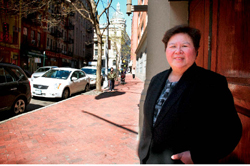A Voice (and Appreciator) of Experience
A Voice (and Appreciator) of Experience
At P.S. 130 in Manhattan’s Chinatown neighborhood, Principal Lily Woo schedules Parents Association meetings at the start of the school day. School concerts, too.
That’s because Woo, who grew up in Chinatown after her family emigrated from China to New York City when she was a child, knows from firsthand experience that many parents in the neighborhood work long evening hours.
“When we have parent meetings in the morning, we get up to 300 people,” says Woo, whose mother worked in a laundry and father worked in restaurants. “Knowing how the community ticks, and then having that understanding of what kids need, has really made a difference in the school.”
Woo has served since 1990 as principal of P.S. 130, where about 90 percent of the students are Asian and 81 percent come from low-income families. When she first arrived, about 38 percent of the students were reading on grade level. Today, even though a majority of the students come to the school not speaking English, 93 percent are reading at or above grade level, 99 percent are proficient in math, and 98 percent proficient in science and social studies.
Yet despite her Chinatown roots, Woo won her principalship at 130 amid great controversy. Parents and teachers were backing a beloved assistant principal, but the city administration turned to Woo, who had experience with programming for English Language Learners. After she got the job, the district superintendent offered to transfer the assistant principal in order to ease Woo’s transition, but Woo declined, choosing to work with the entire staff she had inherited.
Twenty years, later that same assistant principal still works collaboratively with Woo at P.S. 130.
“He’s a wonderful person and has become a great friend,” she says. “I felt that if I could bring him in and convince him to support the initiatives, then others would go along with it as well.”
Woo was among the first cohort of principals participating in TC’s Cahn Fellows program in 2003. After 13 years of leading P.S. 130, she was finding it lonely at the top without peers to give her feedback on new initiatives or thorny issues. She was mentoring other principals around the city, but her own professional development was at a standstill.
The program gave her the peer contact and support she craved. She also enjoyed being back in school, even though the Cahn Fellows study a lot of history—a subject she had never liked because “it was always about memorizing dates and places.” However, when the Cahn Fellows visited the Civil War battlefield in Gettysburg and read about the decision-making of the generals, history came sharply alive.
“It opened my eyes,” she says. And her ears—for one of the harsh realities of Gettysburg is that, in many instances, hundreds and even thousands of lives could have been saved if commanders had listened to their subordinates.
“It shows that you really have to be a good listener,” she says. “You really have to take people’s input into account and weigh all options. You can’t just say, ‘We are doing it my way because I said so.’”
Published Wednesday, May. 19, 2010
